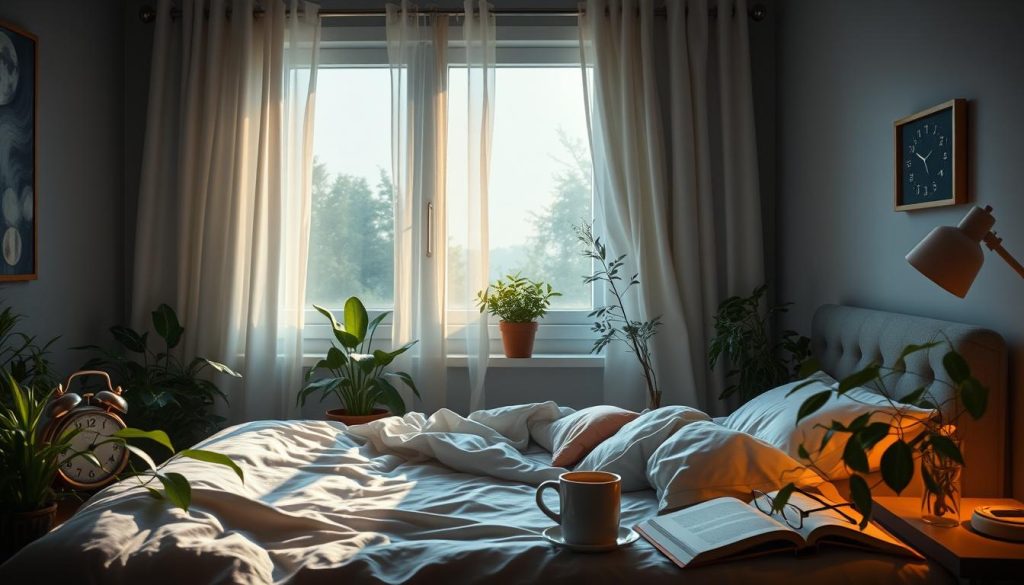Our bodies have a natural rhythm that controls when we sleep and wake. This rhythm, called the sleep-wake cycle or circadian rhythm, is key to our health. Understanding it helps us live in sync with our body’s natural pace.
This can lead to better sleep, more energy, and overall health improvement. By aligning our daily lives with our body’s rhythms, we can feel more alive and healthy.
In this article, we’ll explore the sleep-wake cycle’s importance and how it affects our health. We’ll look at what influences it and how to keep a healthy rhythm. By the end, you’ll know how to use your body’s natural rhythms for a better life.
Understanding the Sleep-Wake Cycle
Our bodies have a natural 24-hour rhythm called the sleep-wake cycle. It’s controlled by our internal clocks, or circadian rhythms. These rhythms are vital for our health, affecting sleep, hormone levels, and how well we think.
What Is the Sleep-Wake Cycle?
The sleep-wake cycle tells us when to be awake and when to sleep. It’s managed by our internal clock. This clock makes sure we’re tired at night and awake during the day.
The Importance of Circadian Rhythms
- Circadian rhythms help us feel tired at night and awake in the day.
- They control hormone levels, like melatonin for sleep and cortisol for energy.
- Good circadian rhythm helps us get quality sleep, including REM sleep. This is key for thinking and memory.
- When our rhythms are off, we can face health problems like sleep disorders and hormone imbalances.
Knowing how our sleep-wake cycle and circadian rhythms work is important for our health.

Factors Influencing Your Sleep-Wake Cycle
Our sleep-wake cycle, or circadian rhythm, is shaped by many things. Knowing these can help us sleep better and feel good.
Light Exposure
Light is a big player in our circadian rhythms. Our bodies use light to know when to wake up or sleep. Evening light can mess with melatonin, the sleep hormone.
Hormones
Hormones also control our sleep-wake cycle. Melatonin, made by the pineal gland, helps us sleep at night. Cortisol, the stress hormone, wakes us up in the morning.
Age and Lifestyle
As we get older, our sleep patterns change. Older people sleep less soundly and go to bed earlier. What we do, like exercise and diet, affects our sleep too.
| Factor | Impact on Sleep-Wake Cycle |
|---|---|
| Light Exposure | Bright light disrupts melatonin production, leading to difficulty falling asleep |
| Hormones | Melatonin promotes sleepiness, while cortisol increases alertness |
| Age | Older adults often experience more fragmented sleep and earlier bedtimes |
| Lifestyle | Exercise, diet, and stress levels can significantly impact sleep quality and timing |
Understanding what affects our sleep-wake cycle helps us improve our sleep. This supports our health and well-being.

The Sleep-Wake Cycle and Your Health
Our sleep-wake cycle is key to our health. When it’s off, our health suffers. Sleep issues can lead to chronic diseases and mental problems.
Effects of a Disrupted Sleep-Wake Cycle
A broken sleep cycle can cause sleep loss. This is linked to obesity, diabetes, and heart disease. It also harms our brain, making it hard to remember and focus.
Circadian rhythm disorders, like jet lag, can cause depression and anxiety. These disorders mess with our mood and emotions.
| Condition | Link to Disrupted Sleep-Wake Cycle |
|---|---|
| Obesity | Sleep loss can make us hungrier and eat more. |
| Diabetes | Not sleeping well can mess with blood sugar and insulin. |
| Cardiovascular Disease | Sleep loss can cause inflammation and high blood pressure. |
| Mental Health Disorders | Disrupted sleep can lead to depression, anxiety, and bipolar disorder. |

Knowing how important sleep is helps us stay healthy. Next, we’ll talk about how to sleep better and create a good sleep space.
Optimizing Your Sleep-Wake Cycle
Keeping a healthy sleep-wake cycle is key for our well-being. We need to focus on two main things: a consistent sleep schedule and a sleep-friendly environment.
Establishing a Consistent Sleep Schedule
Going to bed and waking up at the same time every day is important. This helps our body’s internal clock stay in sync. It also helps our natural sleep patterns.
- Aim for 7-9 hours of sleep each night, as it’s best for adults.
- Keep the same bedtime and wake-up time, even on weekends, for a consistent schedule.
- Try not to take long naps during the day, as they can mess up your sleep cycle.
Creating a Sleep-Friendly Environment
The place where we sleep greatly affects how well we rest. By making our sleep space comfortable, we can improve our sleep hygiene and cycle.
- Make sure your bedroom is cool, dark, and quiet. Light and noise can mess up your sleep.
- Use comfy bedding and keep the room at a good temperature.
- Don’t use electronic devices like phones or tablets in bed. The blue light they give off can stop melatonin production and hurt sleep.
By having a regular sleep schedule and a cozy sleep space, we can better our sleep-wake cycle. This supports our health and well-being.
Natural Ways to Regulate Your Sleep-Wake Cycle
Keeping a healthy sleep-wake cycle is key for our well-being. There are natural ways to help with this. Getting enough natural light during the day is important. It helps our bodies make the right amount of melatonin, which controls our sleep.
Light Exposure and Sleep
Being in natural sunlight during the day helps our body clocks stay in sync. This leads to better sleep at night. But, the blue light from screens can mess with our sleep patterns.
Try to avoid screens before bed and make your bedroom dark. This helps your body relax and sleep better.
Exercise and relaxation techniques also help with sleep. Working out can lower stress and improve sleep. Activities like meditation, yoga, and deep breathing help us relax before bed.

